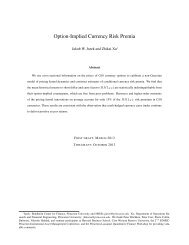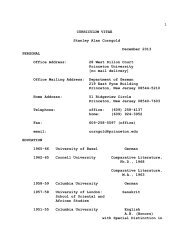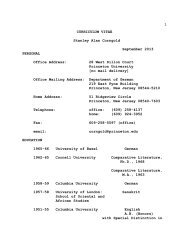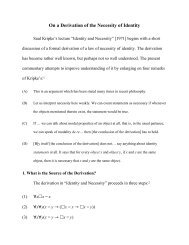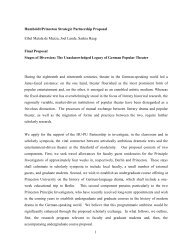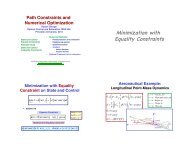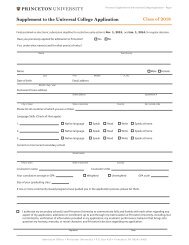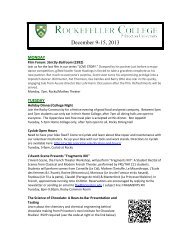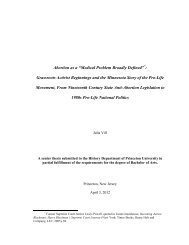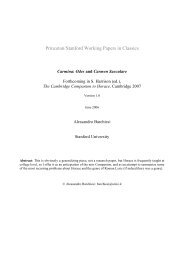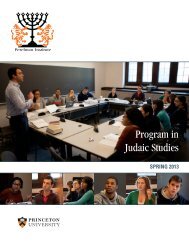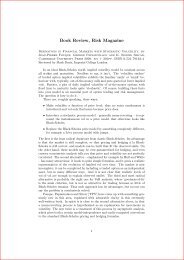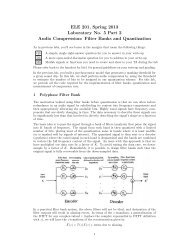Campaign residen the P -litics - Princeton University
Campaign residen the P -litics - Princeton University
Campaign residen the P -litics - Princeton University
Create successful ePaper yourself
Turn your PDF publications into a flip-book with our unique Google optimized e-Paper software.
P<br />
34<br />
PHILOSOPHY<br />
THINKERS TAKE<br />
PHILOS0PHY TO THE STREETS<br />
TESTSTHESE<br />
BY DAVID MENCONI<br />
a particularly horrific wartime dilemma. You’re a doctor<br />
tending to people in <strong>the</strong> squalid Jewish ghetto of a Nazioccupied<br />
town, where several of your patients have come<br />
down with typhoid fever. The expedient thing would be to<br />
report that to <strong>the</strong> authorities, even though <strong>the</strong> patients face<br />
certain execution. If you don’t report it, you’re risking an<br />
outbreak that would result in <strong>the</strong> Nazis executing everyone<br />
in <strong>the</strong> ghetto (including you) and burning it to <strong>the</strong> ground.<br />
So what is <strong>the</strong> ethically and morally “right” thing to do?<br />
This scenario happened in Kovno, Lithuania, during World<br />
War II — <strong>the</strong> doctor kept quiet and, with o<strong>the</strong>rs, quelled <strong>the</strong><br />
outbreak. It’s <strong>the</strong> sort of moral question that philosophers regularly<br />
grapple with. For most of <strong>the</strong> past century, <strong>the</strong> timehonored<br />
method for philosophical consideration of such<br />
questions was to sit and ponder <strong>the</strong>m alone. Those trained<br />
in philosophical thinking should arrive at intuitions about<br />
right and wrong that are defensible as universal and true.<br />
Except that in <strong>the</strong> real world, <strong>the</strong>re’s not much consensus<br />
about anything. That especially goes for questions of morality,<br />
where one person’s obligation to act in a way that yields <strong>the</strong><br />
utilitarian greater good is ano<strong>the</strong>r’s unconscionable assumption<br />
of <strong>the</strong> role of God. Enter “experimental philosophy” —<br />
or “x-phi” — a method that brings ordinary folks into <strong>the</strong><br />
process.<br />
Where traditional philosophers try to deduce what every-<br />
May 16, 2012 <strong>Princeton</strong> Alumni Weekly • paw.princeton.edu<br />
one else thinks by intuition, experimental philosophers ask<br />
everyone else what <strong>the</strong>y think directly. X-phi data can take<br />
<strong>the</strong> form of everything from opinion surveys to magnetic<br />
resonance imaging (MRI) scans. Then, applying a philosophical<br />
mindset to <strong>the</strong> research data, experimental philosophers<br />
seek to arrive at universal insights into free will, intentionality,<br />
<strong>the</strong> existence of objective moral truth, and o<strong>the</strong>r age-old<br />
questions. Among o<strong>the</strong>r things, experimental philosophers<br />
have discovered that <strong>the</strong>re is far less unanimity of opinion<br />
out <strong>the</strong>re than traditional philosophy has maintained.<br />
“The terrific thing about experimental philosophy is that,<br />
before it happened, philosophers would say, ‘This is intuitively<br />
<strong>the</strong> right answer,’” says <strong>Princeton</strong> philosophy professor<br />
Gilbert Harman. “Then <strong>the</strong>y’d try to develop a <strong>the</strong>ory<br />
accounting for that intuition. If you did not share that intuition,<br />
you were out of luck.”<br />
<strong>Princeton</strong> is ground zero for experimental philosophy, and<br />
Harman its fa<strong>the</strong>r — even though Harman describes his<br />
relationship with x-phi as “complicated” because he doesn’t<br />
do philosophy experiments himself. But some of <strong>the</strong> field’s<br />
leading figures have passed through Harman’s classrooms<br />
over <strong>the</strong> last decade, where <strong>the</strong>y heard questions like those<br />
he recently was asking 200 undergraduates in an<br />
“Introduction to Moral Philosophy” class.<br />
“Is morality something you can get into disagreements<br />
over?” Harman asked. “About who is right and who is wrong?<br />
And if so, is <strong>the</strong>re a way of finding out <strong>the</strong> answer? Are <strong>the</strong>re<br />
ways of testing one moral <strong>the</strong>ory against ano<strong>the</strong>r in <strong>the</strong><br />
VINCIANE VERGUETHEN



